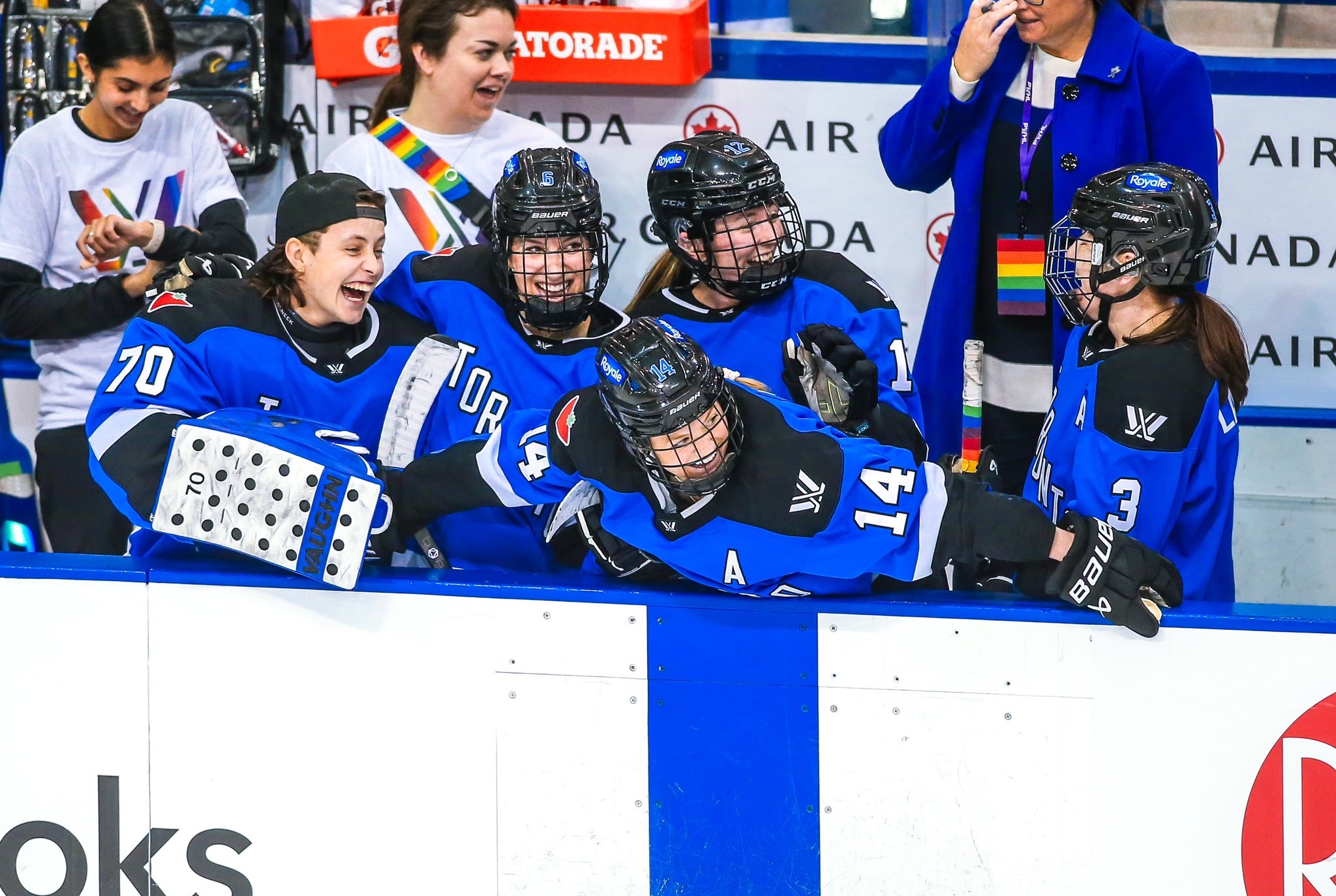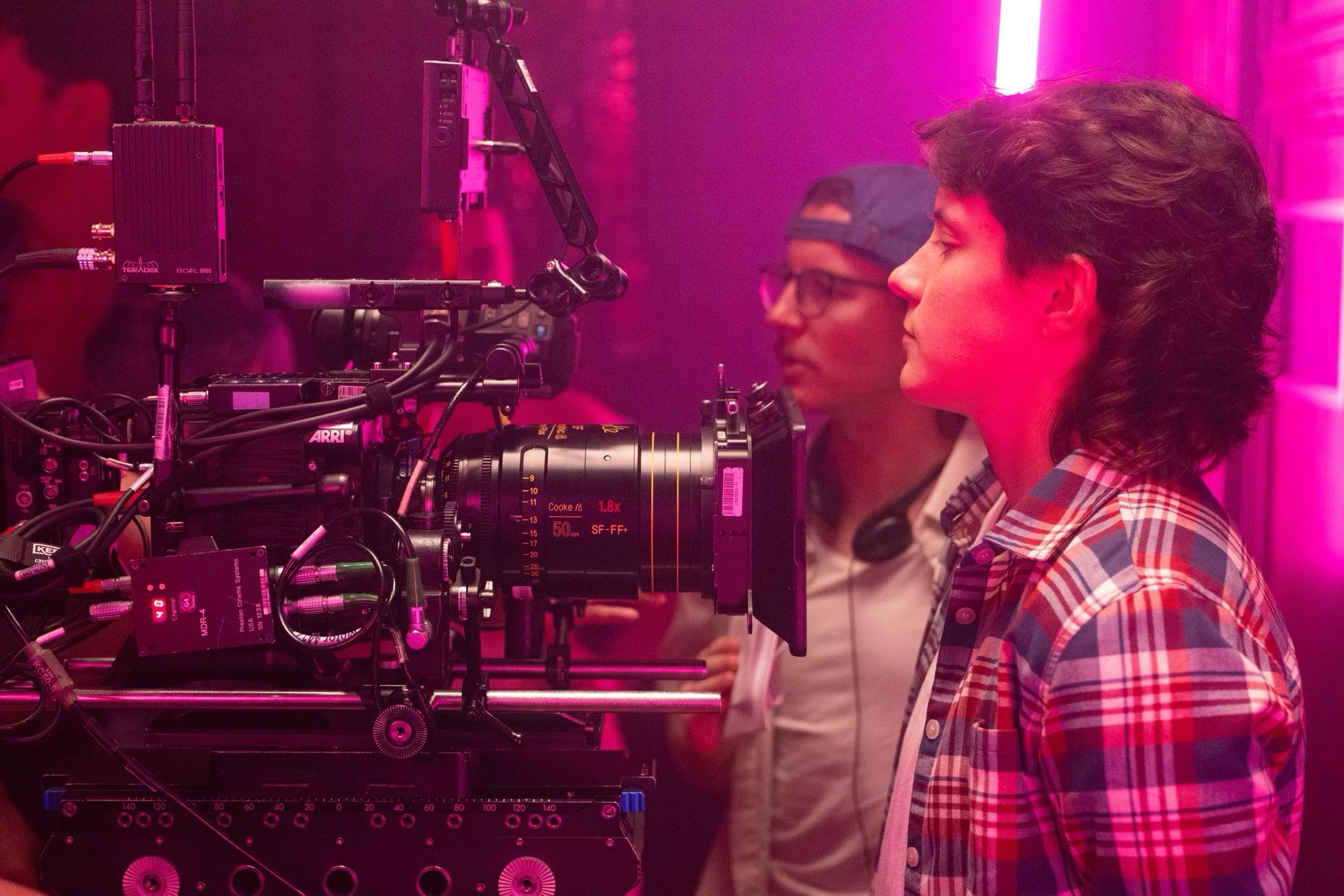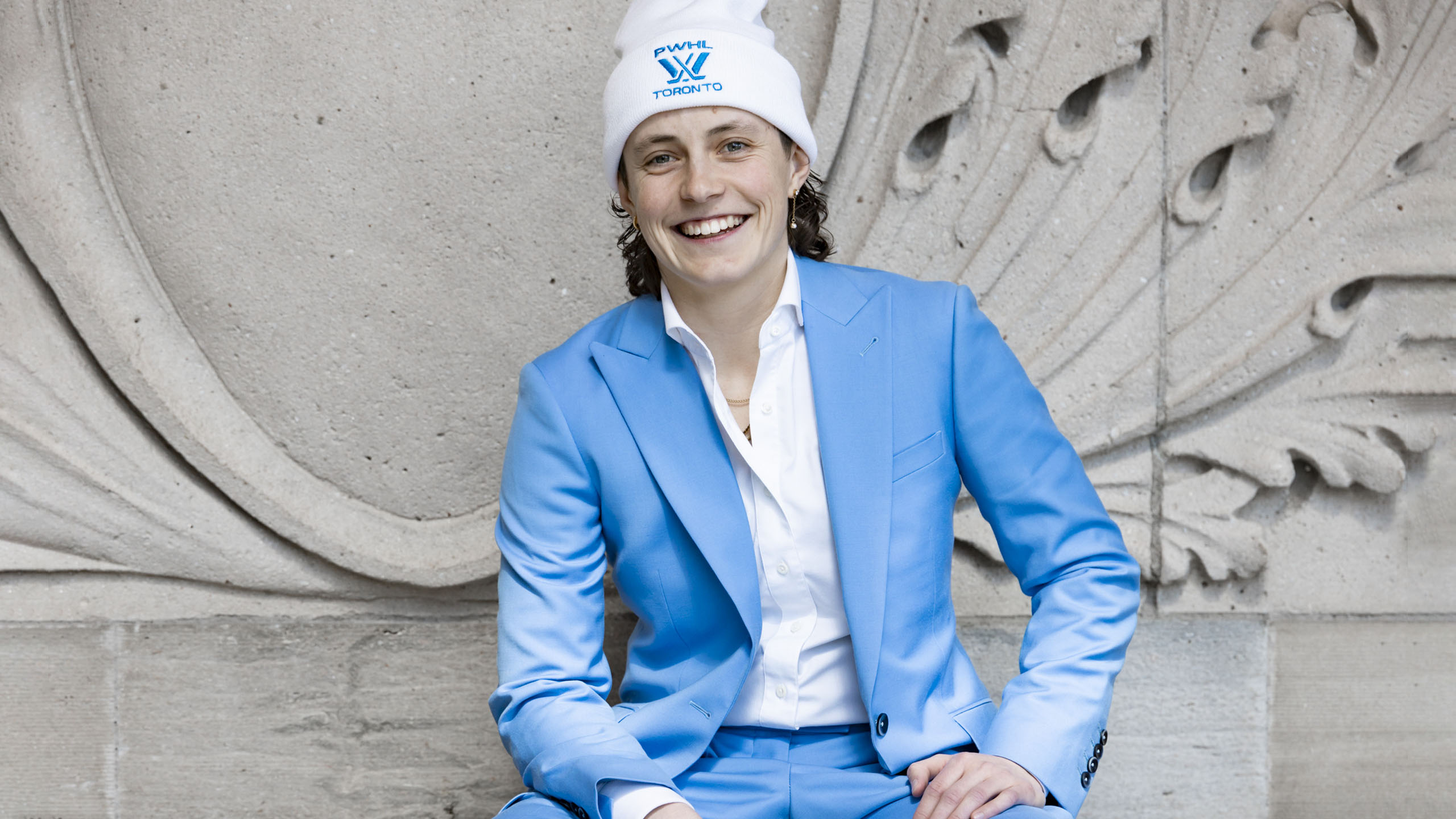On the ice, Carly “CJ” Jackson is a brick wall in their role as a goaltender for the Professional Women’s Hockey League’s (PWHL) Toronto Sceptres. On social media, she fluctuates between being a funny guy with jokes about lesbians and U-Hauls, and being an unlikely style icon and the unofficial heartthrob of the league, showing off sleek suits and posting photos in which she does her best impression of a disaffected cowboy, staring aloofly off into the middle distance. They ooze confidence and charisma from every pore and stand out against many of the less flashy players in a sport that tends to lean more conservative when it comes to its culture.
“I just remember feeling very stiff about [gameday outfits],” Jackson tells Xtra. “And then I remember seeing the WNBA, and it seemed like they wore what they felt cool in and I tried to grab on to that. I think a lot of players have tried to grab on to that and that has been creating much more diversity and expression of self among different players. It’s nice to see people come out of their shells, but I wonder, too, if there’s some part of the dynamic of the sport that’s almost hidden, because we’re wearing masks and gear, and we put on this armour where you’re like a different persona.”
In many ways, Jackson is one of the most public and recognizable faces of the PWHL despite not being one of the star players based solely on her stat sheet. But they are a fan favourite and the forever-crush of many of the queers in the stands. The way the fans have embraced her is “such a representation of queer joy for me,” she says. “I never expected to stumble upon this [role], and I love it.”
But the CJ Jackson I meet over Zoom is not the CJ Jackson I’m expecting. Don’t get me wrong, they still have their signature mullet and slight twinkle in their eyes, the smile that’s more of a smirk that curls up at one corner of their mouth. But the Jackson I’m expecting is the one I’ve gotten to know through her confident goaltending and cheeky social media presence, the player whose sparkle first drew me in to watching women’s pro hockey.
“CJ brings a lot of heart to the PWHL and it’s no surprise that they are a fan favourite,” says Harrison Browne, a former pro women’s hockey player and friend of Jackson’s. “When I walked with members of the PWHL this past [Toronto] Pride parade, it was amazing to see all the people just absolutely swoon when they saw CJ coming. They are so genuine and love the game so much it’s infectious.”

Credit: Heather Pollock
But the Jackson I meet for this interview is a quieter, more reflective Jackson, someone who carefully considers the answer to every question before she shares a response to it—not necessarily because she wants to be sure to say exactly the right thing, but because, it seems, she is someone who is thoughtful about her place in the world and how she wants to move through it. The Jackson who is entering her fifth season as a pro hockey player is one who seems settled in their own skin and surefooted about who they are. There is an ease to the way she carries herself.
“I like to think that it was the way my parents taught me to always have a strong belief in your sense of self, and that there’s so much power behind that,” says Jackson, who grew up in Amherst, Nova Scotia. “So I think that, combined with the power that I found in my own identity of just doing all the things that feel like me and not having any fear in doing that, I hope that has been a beacon of light for members of the queer community. I’m very proud of being able to be on a platform to represent that light.”
Jackson played three seasons and won a championship as a member of the Toronto Six in the now-defunct Premier Hockey Federation before signing with the Sceptres during their 2023 training camp ahead of the PWHL’s first season. They say they wanted to make sure they took time to grieve the folding of the PHF before fully embracing the new reality of the PWHL. She had just won a championship with the Six and had been signed to return for the next season. Suddenly, that no longer existed. They also had no idea what it would mean for their career because it wasn’t a guarantee that they would be drafted into this new league (and they weren’t).
“I allowed myself to be sad, like, really sad, and work through the emotions of it,” Jackson says, their sensitive, Cancerian nature shining through. “I thought it was important, because I knew that if I didn’t grieve it, it would resurface in some other way in my life.” Eventually, she got to a place of acceptance and excitement for the new thing that women’s hockey was building. When they got an invite to Toronto’s training camp, they were elated.
In just a single year, Jackson and many of the other PWHL players went from playing for a league with very little money, even less media coverage, and a small but dedicated fan base to selling out NHL arenas. After its inaugural season with six teams—in addition to Toronto, there are teams in Montreal, Ottawa, New York, Boston and Minnesota—the league has already announced that it will be adding two more teams for the 2025-26 season. This rapid growth has been the result of a huge investment boom in women’s sports, as well as the women’s hockey world finally consolidating all its resources and talent into one, centralized pro league rather than scattering it around a smattering of smaller, fledgling outlets.
That Jackson is part of the generation of athletes who get to experience this is something she describes as “dreamlike” and being “in the right place, right time” in her career. “I know there are so many athletes before this time who have made this happen, and to be one of the ones that get to live it? I just feel a lot of gratitude,” they say.
And while the adjustment has been exciting, it has also been jarring at times—especially when people express surprise at how good the on-ice product is. “I think sometimes it comes from really good intentions, but they’re like, ‘Oh, whoa! This is great,’ and I’m like. ‘It has been great.’ And there’ve been so many great athletes that have actually come before us, women’s hockey has been really great for a long time and now it has the stage I think it deserves.”
Jackson is ready for the PWHL’s second season to start on Nov. 30, especially after Toronto’s inaugural season ended in the first round of the playoffs. There will be more games, more eyes and new uniforms and branding—the teams played their first season without names or logos, debuting their new team identities shortly before the season kicks off. She is also looking forward to getting back to the hockey of it all. This off-season, Jackson took on their first acting role in Pink Light, a short film written and produced by Harrison Browne, who was the first athlete to transition while playing pro women’s hockey. Jackson plays the role of Scotty—the pre-transition version of Scott, who is played by Browne (and based on Browne’s own experiences).

Credit: R Austin Ball
Acting is very different from hockey—that protective armour, the mask Jackson gets to wear on the ice, that’s all stripped away. And though as an actor she is still taking on another persona in the ways an athlete might when they are competing, she feels much more exposed while performing. “Acting is a really vulnerable space to be in emotionally, because you’re trying to tell a story and be in the emotional state of the character at that time,” Jackson says. “It was pretty scary, but [everyone on set] was really kind to me, and really patient.”
Despite having no acting experience, Jackson is in many ways perfect for the part, and not just because she really does look like a younger version of Browne. Though the two had never met before working on the film together, Jackson and Browne have been on parallel paths throughout their lives—they both played hockey for the University of Maine, with Jackson arriving to school the year after Brown graduated, and both played for the Buffalo Beauts in the PHF (though the league was called the National Women’s Hockey League when Browne played).
And Jackson’s involvement in Browne’s film, playing a younger version of a trans hockey player, is a nod to the ways that Browne’s transition and the impact it had on women’s hockey paved the way for players like Jackson, who don’t identify as women but who are playing women’s sports nonetheless.
“It was important to me to be able to play the role of a trans man, or a pre-transition man, because while my story with gender identity isn’t the same as Harrison’s, it’s very fluid,” says Jackson. “If I had to put a label on it, I would call myself non-binary. For me, it’s just having a connection outside of the binary of female or male. That is powerful to me.”
“Having a non-binary player be such a prominent figure within the league means a lot for any young gender-diverse kid looking in wondering if they have a space in this sport,” Browne says. “The way hockey welcomed me back in the day and how it’s welcoming the next wave of players like in CJ is just so heartwarming in a time when gender diversity within sports can be so volatile.”
Oh, and there’s one more thing Jackson wants her fans to know: the “CJ” isn’t for “Carly Jackson,” as many fans think—and would make going by “CJ Jackson” kind of redundant. “The ‘CJ’ is for ‘Carly Jane,’” they explain. “I don’t know why I felt compelled to share that. But it’s been on my mind all day.”


 Why you can trust Xtra
Why you can trust Xtra


